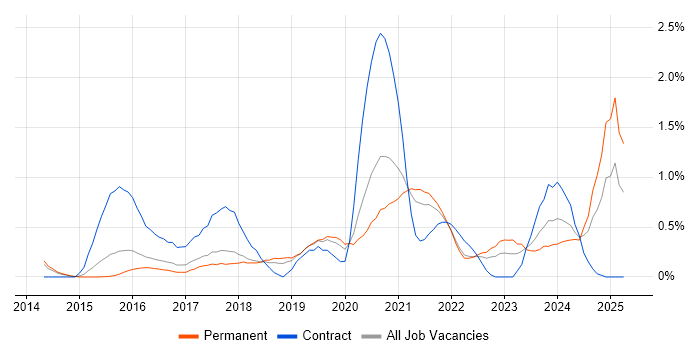NumPy
East of England > Cambridgeshire
The table below provides summary statistics for permanent job vacancies advertised in Cambridgeshire requiring NumPy skills. It includes a benchmarking guide to the annual salaries offered in vacancies that cited NumPy over the 6 months leading up to 5 May 2025, comparing them to the same period in the previous two years.
| 6 months to 5 May 2025 |
Same period 2024 | Same period 2023 | |
|---|---|---|---|
| Rank | 47 | 92 | 118 |
| Rank change year-on-year | +45 | +26 | +45 |
| Permanent jobs citing NumPy | 11 | 9 | 6 |
| As % of all permanent jobs advertised in Cambridgeshire | 2.27% | 0.58% | 0.41% |
| As % of the Libraries, Frameworks & Software Standards category | 9.24% | 3.10% | 1.42% |
| Number of salaries quoted | 0 | 9 | 6 |
| 10th Percentile | - | - | £52,500 |
| 25th Percentile | - | £62,500 | £58,438 |
| Median annual salary (50th Percentile) | - | £70,000 | £75,000 |
| Median % change year-on-year | - | -6.67% | -13.39% |
| 75th Percentile | - | £72,500 | £77,500 |
| 90th Percentile | - | £80,001 | - |
| East of England median annual salary | - | £70,000 | £75,000 |
| % change year-on-year | - | -6.67% | -13.39% |
All Software Libraries and Frameworks
Cambridgeshire
NumPy falls under the Software Libraries and Frameworks category. For comparison with the information above, the following table provides summary statistics for all permanent job vacancies requiring technical specification, industry standards, software libraries and framework skills in Cambridgeshire.
| Permanent vacancies with a requirement for technical specification, industry standards, software libraries and framework skills | 119 | 290 | 422 |
| As % of all permanent jobs advertised in Cambridgeshire | 24.54% | 18.63% | 28.67% |
| Number of salaries quoted | 85 | 233 | 176 |
| 10th Percentile | £33,500 | £38,150 | £36,250 |
| 25th Percentile | £42,500 | £43,750 | £42,500 |
| Median annual salary (50th Percentile) | £55,000 | £65,000 | £62,500 |
| Median % change year-on-year | -15.38% | +4.00% | +4.17% |
| 75th Percentile | £72,500 | £77,500 | £80,000 |
| 90th Percentile | £78,250 | £92,500 | £89,375 |
| East of England median annual salary | £62,500 | £55,000 | £60,000 |
| % change year-on-year | +13.64% | -8.33% | +9.09% |
NumPy
Job Vacancy Trend in Cambridgeshire
Job postings citing NumPy as a proportion of all IT jobs advertised in Cambridgeshire.

NumPy
Salary Trend in Cambridgeshire
3-month moving average salary quoted in jobs citing NumPy in Cambridgeshire.
NumPy
Job Locations in Cambridgeshire
The table below looks at the demand and provides a guide to the median salaries quoted in IT jobs citing NumPy within the Cambridgeshire region over the 6 months to 5 May 2025. The 'Rank Change' column provides an indication of the change in demand within each location based on the same 6 month period last year.
| Location | Rank Change on Same Period Last Year |
Matching Permanent IT Job Ads |
Median Salary Past 6 Months |
Median Salary % Change on Same Period Last Year |
Live Jobs |
|---|---|---|---|---|---|
| Cambridge | +43 | 11 | - | - | 7 |
| NumPy East of England |
|||||
NumPy
Co-occurring Skills and Capabilities in Cambridgeshire by Category
The follow tables expand on the table above by listing co-occurrences grouped by category. The same employment type, locality and period is covered with up to 20 co-occurrences shown in each of the following categories:
